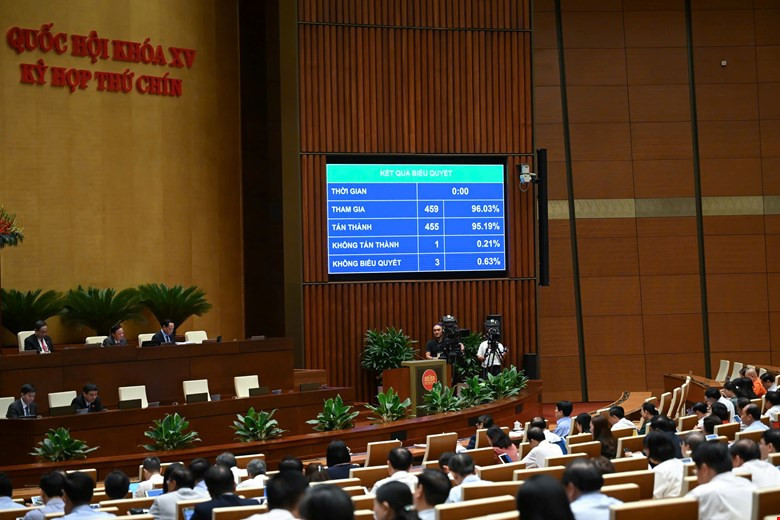On the morning of June 16, the National Assembly officially passed the amended Employment Law with overwhelming support - 455 out of 459 votes in favor. One of the most notable provisions includes expanding the scope of individuals eligible for unemployment insurance contributions.

The revised Employment Law consists of 8 chapters and 55 articles - three fewer than the initial draft submitted at the beginning of the 9th legislative session.
Compared to the current law, the amendment introduces 12 new groups of provisions that align with the objective of legislative reform and the shift in policy-making mindset.
Specifically, the law adds provisions for government support in job creation, self-employment, and labor market transitions. It also includes policies that encourage skill development and job creation in emerging fields such as science and technology, innovation, digital transformation, circular economy, and green economy.
The law expands access to preferential credit for those seeking employment abroad, making it easier for Vietnamese workers on overseas contracts to secure loans. The government is authorized to determine additional eligible groups for low-interest loans to support job creation, job maintenance, expansion, and overseas employment, based on socio-economic conditions. It also introduces employment support policies for elderly workers.
Most notably, the law broadens the scope of unemployment insurance to include workers on contracts of at least one month and part-time workers whose monthly wages meet or exceed the minimum threshold required for compulsory social insurance.
Under the revised law, unemployment insurance contributions will follow a flexible model. Employees will contribute up to 1% of their monthly salary. Employers will contribute up to 1% of their total monthly wage fund for participating workers. The state will support up to 1% of the monthly wage fund for participating workers, funded by the central budget.
The amended Employment Law will take effect on January 1, 2026.
Nguyen Dac Vinh, Chairman of the National Assembly’s Committee for Culture and Society, stated that the committee coordinated with relevant agencies to incorporate and address feedback from legislators. The revisions align with the shift toward modern legislative thinking.
For example, the law includes provisions suggested by lawmakers, such as introducing a national vocational skills development strategy, prioritizing support for the private sector as a key driver of sustainable employment, and providing financial mechanisms to help businesses retrain and upskill workers.
It also authorizes the government to determine eligibility for low-interest job creation loans based on the national economic context.
Additionally, the Committee for Culture and Society urged the government to continue reviewing feedback and issue detailed regulations to implement policies that support training and upskilling for unemployment insurance contributors, in line with labor market demands, digital transformation, artificial intelligence, climate change, and an aging population.
The Vinh